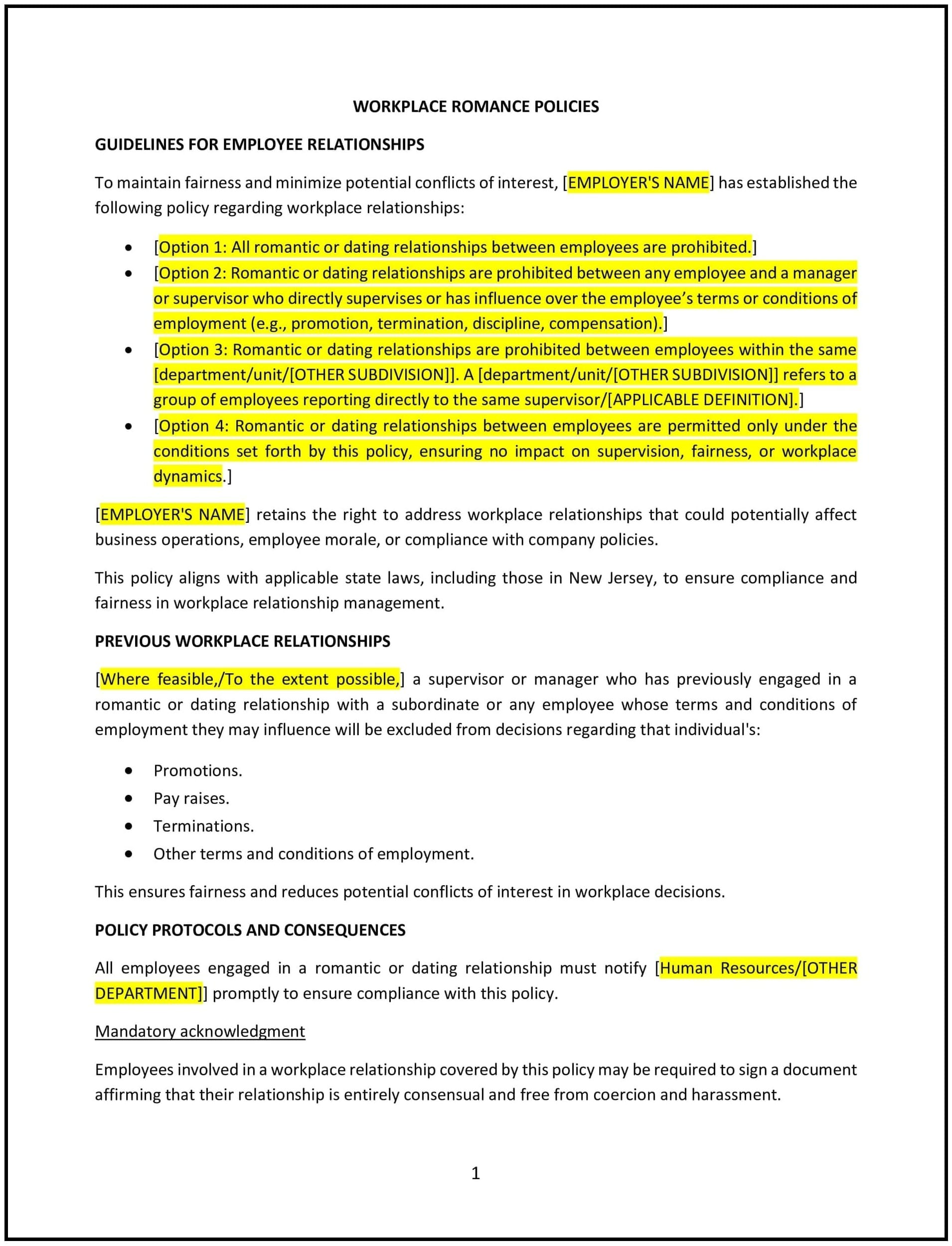Workplace romance policy (New Jersey): Free template
Got contracts to review? While you're here for policies, let Cobrief make contract review effortless—start your free review now.

Customize this template for free
Workplace romance policy (New Jersey)
A workplace romance policy helps New Jersey businesses manage relationships between employees that may develop into romantic or intimate partnerships. This policy outlines the company’s approach to handling workplace romances, addressing potential conflicts of interest, maintaining professional behavior, and ensuring a respectful work environment.
By adopting this policy, businesses in New Jersey can maintain a professional and harmonious workplace while protecting the interests of both employees and the company.
How to use this workplace romance policy (New Jersey)
- Define acceptable behavior: Clearly state the company’s expectations for professional conduct in the workplace, including how romantic relationships between employees should be managed.
- Address conflicts of interest: Specify how workplace romances should be handled to avoid conflicts of interest, particularly when one employee may be in a supervisory or decision-making role over the other.
- Implement disclosure requirements: Outline whether employees are required to disclose romantic relationships with colleagues, especially if there is a direct reporting relationship or a conflict of interest.
- Establish guidelines for workplace behavior: Emphasize that workplace romances should not interfere with work duties or create disruptions, and that employees should maintain appropriate boundaries while at work.
- Set consequences for violations: Define the disciplinary measures that will be taken if the policy is violated, such as reassignment, counseling, or other corrective actions.
- Protect employees from harassment: Clearly state that any romantic relationship must not lead to harassment, discrimination, or any form of undue influence in the workplace.
- Provide options for resolving conflicts: Outline the steps employees should take if they feel uncomfortable or pressured due to a workplace romance, including how to report concerns to HR.
- Review and update: Regularly assess the policy to ensure it reflects New Jersey laws, company practices, and any changes in the workplace environment.
Benefits of using this workplace romance policy (New Jersey)
This policy provides several benefits for New Jersey businesses:
- Maintains professionalism: Helps ensure that personal relationships do not interfere with work performance, business operations, or workplace dynamics.
- Reduces conflicts of interest: Prevents situations where workplace romances could lead to favoritism or the perception of unfair treatment in the workplace.
- Promotes a respectful environment: Establishes clear boundaries for behavior, helping to prevent situations that could lead to harassment or a hostile work environment.
- Protects employees: Provides a clear process for employees to address concerns related to workplace romances, helping to prevent any negative consequences such as harassment or retaliation.
- Enhances workplace transparency: By encouraging disclosure and setting clear expectations, the policy promotes transparency and ensures that all employees are treated fairly.
Tips for using this workplace romance policy (New Jersey)
- Communicate the policy clearly: Ensure that all employees are aware of the workplace romance policy, the importance of maintaining professionalism, and the procedures for disclosing relationships when required.
- Encourage respectful relationships: Promote a culture of respect and professionalism, ensuring that employees understand the potential impact of workplace romances on their colleagues and the work environment.
- Monitor for conflicts of interest: Be proactive in identifying potential conflicts of interest, such as supervisory relationships, and address them appropriately to ensure fairness and transparency.
- Be transparent about consequences: Clearly explain the consequences of violating the policy to deter any actions that could lead to inappropriate behavior or conflicts of interest.
- Review the policy regularly: Update the policy to reflect changes in New Jersey laws, workplace culture, or business operations.